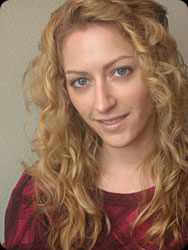 Jane McGonigal, director, EVOKE.
Jane McGonigal, director, EVOKE.
Where did the idea for EVOKE come from?
Jane McGonigal: The World Bank Institute originally created the idea for an online alternate reality game about social innovation and social enterprise. The World Bank Institute invited our creative team – myself and Writer/Producer Kiyash Monsef – to become involved in developing the game last summer, in June. We have been working since then to create the story of the EVOKE network, to produce the online graphic novel, to design the game missions, to build the online network, and to train our live game running team.
Kiyash and came up with the idea for the EVOKE story, or the online graphic novel, which is set ten years in the future. Our vision is that today’s creative problem-solvers in Africa will represent the leading-edge of problem-solving in the future. Africa is tackling some of the world’s most urgent problems, and doing so with limited resources and against many challenges. For this reason, African problem-solvers represent a new kind of ingenuity, creativity and resourcefulness. Our EVOKE story imagines that in the future, the rest of the world will look to Africa for solutions. Any crisis that we may face in the future – as a result of climate change, natural disasters, economic collapse, pandemic – we can tackle with solutions that African problem-solvers are coming up with today to fight hunger, poverty, disease, and to create more economic opportunity, better education, better energy access, clean water access, and better technology access.
What do you want to achieve with EVOKE?
Jane McGonigal: The main goal of the game as the WBI conceived it would be to help players develop the skills needed for successful social innovation – creativity, resourcefulness, entrepreneurship, sustainability, and vision, for example. The WBI also wanted the game to lead to real-world action. They wanted players to produce an original concept for a new social venture at the end of the game. When we were invited to design the ARG, this idea – that players would develop a working idea and a creative pitch for a real business – is what excited us most. I believe that games can lead to real change, and I always look for this kind of real-world outcome when I take on a new game project. So that’s why we said yes immediately to partnering with the WBI on this game. One of the major creative ideas that we brought to the table is the idea that we should open up the game to the entire world – not just Africa – so that we could inspire global collaboration and collective intelligence. We are also looking to successful business leaders, educators, entrepreneurs, and creative people all over the world to serve as mentors for our players in Africa. (Be sure to read the How to mentor instructions: http://tinyurl.com/yecdhqa
You are also involved with the Institute for the Future (IFTF). Tell us more about this.
Jane McGonigal: IFTF is a non-profit research group based in Palo Alto, California. You can find out more at www.iftf.org. I am the director of Game research & development there. I have been working with IFTF for 3 years. My work there focuses on how games can be used in leading-edge ways – especially for education, future forecasting, and real-world change. IFTF is where I do my research that fuels new ideas for game design, like EVOKE. Many of my colleagues at IFTF will be serving as online mentors for EVOKE players in the game to share what they know about the future of technology, future of business, future of food, future of education, and future of health.
The game officially started on yesterday on 3rd of March. How many people have signed up?
Jane McGonigal: On the 2nd we had just under 6000 EVOKE players enrolled in our crash course in changing the world. Roughly 250 of those are university students in South Africa. We are hoping to reach 10,000 players overall by the end of the game.
Evoke can be played here: www.urgentevoke.com.
Follow Jane on twitter: http://twitter.com/avantgame /
or read her blog: http://blog.avantgame.com.